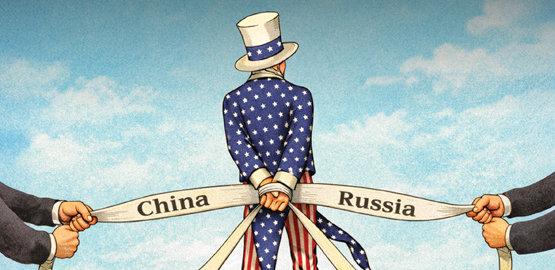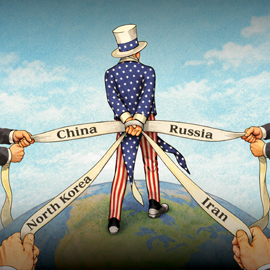News
Not Too Cold, Not Too Hot
In the aftermath of the attacks of September 11, 2001, George W. Bush worried less about rallying the nation to action against the terrorist threat than about warning an enraged public that the campaign would not end anytime soon. The president referred to the emerging “global war on terror” as a generational struggle—one that would go on well past his own tenure and one that would lack an emotionally satisfying endpoint such as V-J Day or the fall of the Berlin Wall.
What Are America’s Alliances Good For?
ABSTRACT: The costs and risks associated with America’s military alliances have always been more visible and easily understood than the benefits. In reality, however, those costs and risks are frequently overstated, whereas the benefits are more numerous and significant than often appreciated. This article offers a more accurate net assessment of America’s alliances in hopes of better informing current policy debates.
Why America Needs a Nuclear Air Launched Cruise Missile
The Defense Department acknowledges that America’s military is on the path toward becoming a hollow force. The signs: declining readiness, insufficient end strength, and aging weapon systems. It is also true that the Pentagon’s nuclear forces have absorbed more than their fair share of cuts since the end of the Cold War, including cuts that have eroded the ability of its bombers to support their strategic deterrence mission. The early termination of the B-2 stealth bomber program at 21 aircraft, about 16 percent of the original requirement, may be the most notorious of these decisions.
Doing What You Know Best
The United States has been continuously engaged in irregular combat since initiating operations in Afghanistan the aftermath of the September 11, 2001 attacks on the U.S. homeland.
Is a U.S.-Russia Reset Possible?
Since the end of World War II, virtually every president has attempted to reset U.S.-Russia relations. Harry S. Truman confided in his diary that he was tired of “babying” the Soviets when they didn’t carry out the obligations they had undertaken at Yalta. Dwight D. Eisenhower’s “Spirit of Geneva” sought to make a new start with Stalin’s successors. John F. Kennedy sought to recalibrate relations with his disastrous Vienna summit, in June 1961, which paved the way for the Berlin Wall and the Cuban Missile Crisis. Richard Nixon sought détente with the increasingly sclerotic Brezhnevite leadership. Jimmy Carter also tried to change the terms of U.S.-Soviet relations early in his term, as did Ronald Reagan, who famously proposed a new strategy—“We win, they lose.” Some of these resets were based on the need to get tougher with Russia and some were based on a desire to find common ground. But after the Cold War, all of the efforts went unrequited. The specific irritants in each case were different, but at the end of the day, all of them failed because the Russian reform project faltered in the late 1990s. As a result, rather than joining the liberal international order, Russia became a revisionist state whose fundamental orientation limited the scope for successful engagement with Moscow. That is why Trump’s reset will almost certainly fail—and a good thing, too, since accommodating Moscow’s current demands would almost certainly mean sacrificing traditional U.S. interests.
The Sane Way to Live with North Korea’s Nukes
Donald Trump’s threat to rain “fire and fury” on North Korea as punishment for its military provocations is the epitome of irresponsible leadership. By invoking the prospect of apocalyptic destruction, Trump risks alienating U.S. allies, distracting attention from North Korean misbehavior, and escalating an already fraught situation.

























